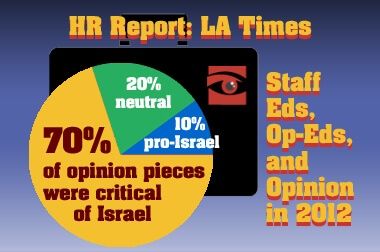This is the third part of our series looking at how the opinion pages of the biggest newspapers in the United States cover Israel. In our previous studies, we concluded that the New York Times demonstrated a clear and consistent anti-Israel bias in both quantity and content of their opinion pages. We also saw that despite problems that we have documented in the coverage of Israel in the Washington Post, its opinion pages were much more balanced when it came to Israel and op-eds and editorials reflecting the Israeli position were frequently published. We now turn to the Los Angeles Times. The last time we reported on the LA Times, we concluded the following concerning its overall coverage of Israel:
By painting a picture of the conflict in which Israel is depicted negatively and the Palestinians are ignored, the LA Times inevitably shapes public perception of Israel and the conflict.
This series is specifically interested in opinion pieces. These are staff-eds and op-eds that, by definition, are written with a bias. These are, by nature, subjective and while — unlike hard news coverage — we do not expect objectivity in every piece, we do expect a balance between those expressing a position supportive of Israel and those which are critical. So, were a diverse range of opinions on Israeli represented in the LA Times opinion pages in 2012?
We found that this was not the case.
In fact, out of the 30 opinion pieces that we analyzed, 21 of them (70%) expressed a negative opinion on Israeli policies. Three of them were supportive of Israel (10%) while six (20%) could be defined as either neutral or balanced (critical of both sides equally.)

Staff Eds The LA Times itself explains what staff-eds are:
What exactly is an editorial? The simple answer is: an unsigned article expressing the newspaper’s opinion on a matter of public interest. It’s the one place in the newspaper where The Times tells you what it thinks as an institution.
So what does the LA Times think of Israel? Of the editorials in our study, six were critical of Israeli actions while only two could be considered neutral. The negative staff-eds argued primarily that delays in the peace process were, in the main, Israel’s sole responsibility. In Mitt Romney: Pandering on a World Stage, the editorial says (emphasis added):
Romney’s eagerness to pander to those voters he perceives to be pro-Israel overwhelmed his common sense……Romney’s comments infuriated Palestinians because they neglected to note the devastating effects of Israeli trade restrictions on the West Bank and of the near-total blockade imposed on Gaza after Hamas took power.
Why is it pandering if blame for the impasse in the peace process is attributed to the Palestinian refusal to enter peace negotiations? Since the editorial raised the subject of the trade restrictions and blockade, shouldn’t those have been put into their proper context? Otherwise, the editorial is pushing a critical opinion of Romney, but of Israeli polices as well. In Is The Two State Solution Dead?, we are told that (emphasis added):
These are dark days for the peace process. Talks are paralyzed. Several Palestinian hunger strikers are in declining health after more than two months without food. Israel retroactively legalized three controversial settlement outposts on the West Bank.
Nothing is mentioned of Palestinian incitement, corruption and rocket attacks against Israel as reasons that the two state solution might be dead. The examples given all reflect badly and one-sidedly on Israel. Talks are “paralyzed” because the Palestinian Authority refuses to talk, not because of any hunger strikers. In Middle East peace takes a beating, the editors cynically ask:
Well, excuse us, but what negotiations and peace process are they referring to? For all intents and purposes, the process has been dead for several years. Palestinians refuse to participate in talks because of continued settlement expansion. Israelis won’t commit to a moratorium on settlement building….. But as it responds (to continued rocket attacks), Israel would be wise to remember the brutal war it fought in Gaza four years ago that killed 1,200 Palestinians without successfully dislodging Hamas or permanently stopping the militants and their rockets. Israel was condemned around the world for that disproportionate assault and gained little. Going back down that familiar path would be catastrophic.
As we have seen in many places, the 1,200 “Palestinians” figure is cited without noting that this is according to Hamas sources and lumps terrorists together with civilians. Even more significant, although the Israeli operation did not completely silence the rockets, the Israeli response drove the Hamas leadership underground and limited the once continuous attacks. Again the editors have chosen to write in a style that shows Israel in the least favorable light. Columns and Op-Eds In explaining which op-eds it selects to publish, the LA Times says: This article is continued on Page 2

